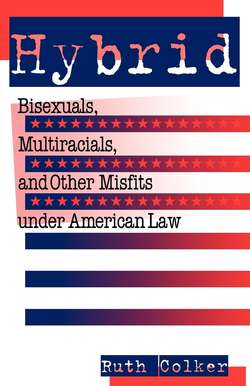Читать книгу Hybrid - Ruth Colker - Страница 12
На сайте Литреса книга снята с продажи.
II. Dilemmas of Categorization
ОглавлениеThe classification problems associated with hybrids are numerous, timely, and deeply perplexing. The U.S. Census Bureau is considering whether to add the category of “multiracial” to its survey instrument, because the current rules require that an individual mark only one racial designation.11 Multiracial organizations have criticized these rules, and as a result they are under revision. Although the old rules are clearly problematic, it is not easy, as we will see, to develop appropriate rules that will work well in the future. Racial classification issues are also flaring up in adoption, tort litigation, and cases involving birth certificates. When adoption agencies decide to grant race-based preferences in adoption, how should multiracial children be classified?
Categorization problems also abound when we talk about gender, sexual orientation, and disability. Should transsexuals be considered victims of “gender” discrimination when they are discharged from employment for dressing in clothing that is considered not consistent with their anatomical gender? In proposing affirmative action plans on the basis of sexual orientation, some institutions are debating whether to provide affirmative action for bisexuals as well as gay men and lesbians.12 In addition, many institutions are considering what criteria to establish for “domestic partners” who may wish to register for certain family-related employment benefits. Finally, the courts and society must decide who is sufficiently “disabled” to fall within the coverage of the Americans with Disabilities Act, Supplemental Social Security, or the Individuals with Disabilities Education Act.13
Each of these classification dilemmas challenges us to construct classification schemes that serve ameliorative rather than subordinating purposes. We must find ways to allow individuals to identify as multiracial, transgendered, bisexual, and bi-abled without the fear that moving off of one polar point on the traditional bipolar scheme will subject them to subordination and necessarily preclude them from taking advantage of ameliorative programs. Our current system of affirmative action often gives an incentive to mixed-race individuals to label themselves as a minority racial category.14 On the other hand, we need to make sure that programs that are designed primarily to assist individuals overcome a history of subordination are not used by individuals who largely have been shielded from that subordination through their presence in a hybrid category. Our current system of affirmative action often allows any member of a defined group to qualify for preferential treatment irrespective of how well affirmative action for that individual serves the purposes of the ameliorative program. Our awareness and recognition of hybrids should force us to be more individualized in understanding the structure of effective and fair ameliorative programs, while not forcing us to abandon group-based approaches entirely.
